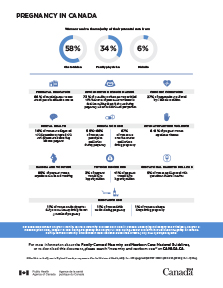Chapter 3 Infographic: Pregnancy in Canada

Download in PDF format
(136 KB, 1 page)
Organization: Public Health Agency of Canada
Date published: 2020-01-27
Women receive the majority of their prenatal care from:
- Obstetrician 58%
- Family physician 34%
- Midwife 6%
Prenatal Education
66% of all primiparous women attend prenatal education classes
Involvement in Decision Making
73% of Canadian mothers are very satisfied with their level of personal involvement in decision making about their care during pregnancy, labour and birth and postpartum
Chronic Conditions
27% of pregnancies are affected by a chronic condition
Mental Health
16% of women are diagnosed with depression or treated with anti-depressants before they become pregnant
Medication Use
59% to 66% of women use prescription medication during pregnancy
67% of women use over-the-counter medications during pregnancy
Intimate Partner Violence
6-8% of pregnant women experience violence
Nausea and Vomiting
85% of pregnant women experience nausea and vomiting
Thyroid Disorders
3% of pregnant women have hypothyroidism
<1% of pregnant women have hyperthyroidism
Gestational Diabetes Mellitus
5% of women are diagnosed with gestational diabetes mellitus
Substance Use
11% of women smoke cigarettes daily or occasionally during the last 3 months of pregnancy
11% of women drink alcohol during pregnancy
1% of women use illegal drugs during pregnancy
For references consult Chapter 1: Family-Centred Maternity and Newborn Care in Canada: Underlying Philosophy and Principles, Chapter 2: Preconception Care, Chapter 3: Care during Pregnancy and Chapter 4: Care during Labour and Birth in: Public Health Agency of Canada. Family-Centred Maternity and Newborn Care: National Guidelines. Ottawa (ON): PHAC; 2017/2018/2019.